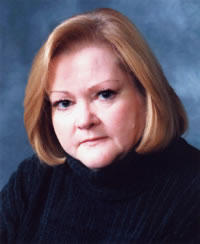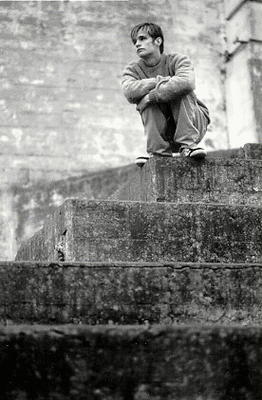 When she was first told why her son had died, that the kids who kicked and punched him to death did so because he was gay, it didn't make it worse for Judy Shepard. When a mother gets a phone call saying her child is barely alive in a hospital, pummelled beyond recognition, she's already at the extreme end of confusion and grief. Additional details, no matter how upsetting, can't make her pain any more excruciating. But after you've buried that child, after you've cried for 40 days and 40 nights, the circumstances that robbed you of him suddenly do matter. And for Judy Shepard at least, those circumstances were almost as heartbreaking as her son's death itself.
When she was first told why her son had died, that the kids who kicked and punched him to death did so because he was gay, it didn't make it worse for Judy Shepard. When a mother gets a phone call saying her child is barely alive in a hospital, pummelled beyond recognition, she's already at the extreme end of confusion and grief. Additional details, no matter how upsetting, can't make her pain any more excruciating. But after you've buried that child, after you've cried for 40 days and 40 nights, the circumstances that robbed you of him suddenly do matter. And for Judy Shepard at least, those circumstances were almost as heartbreaking as her son's death itself."No one should ever die because they are gay," Ms. Shepard says today. "Hate crimes against people for reasons of race, religion, sexual preference are a continuing problem in our society and I believe the way we can eventually eradicate them, or begin to, is through education.
"Hate is a learned behaviour."
And acceptance, she believes, can be one too.
Not surprisingly, Ms. Shepard, an American who speaks to audiences across the United States about the death of her son and the need for a more tolerant society, was disappointed to learn that school board officials in the Vancouver suburb of Surrey recently cancelled a planned high-school production of a play entitled The Laramie Project.
The play is about how townsfolk in Laramie, Wyo., reacted to the news of a gay university student who, in 1998, was lured from a local bar by two young men who beat him badly, tied him to a fence post, and left him for dead. The victim died five days later in hospital.
The real-life crime on which the play is based garnered international attention and made Laramie an unintended battleground in the bitter, continuing debate in the United States between anti-gay activists and gay-rights supporters. In cancelling The Laramie Project at Surrey's Elgin Park Secondary School, the school board took the position that the play's subject matter was not appropriate as family entertainment. School productions are often performed before parents and young children. The board said the play included profanity and references to sex and violence and therefore was not suitable for everyone.
In cancelling The Laramie Project at Surrey's Elgin Park Secondary School, the school board took the position that the play's subject matter was not appropriate as family entertainment. School productions are often performed before parents and young children. The board said the play included profanity and references to sex and violence and therefore was not suitable for everyone.
The decision prompted the expected outcry.
Gay-rights groups suggested the move amounted to censorship and homophobia. They were quick to point out the Surrey school district's history of "homophobic" decisions, including the banning of three books depicting same-sex parents from use in kindergarten.
Laramie Project playwright Moises Kaufman, meanwhile, expressed his own outrage in an interview with a Vancouver newspaper. He, too, called the decision homophobic, and said the play had been performed on high school stages across the United States.
The B.C. Civil Liberties Association also called on the Surrey board to reverse its decision: "Homophobia is one of the most pressing human-rights issues we have in our schools today. . . . Acting precipitously [to ban the play] leaves school administrators open to allegations of bias and intolerance."
The association said that the play does not contain sexuality and that the only violence is a description of the young man's death. Elgin Park drama teacher Stan Engstrom, who was not consulted by the board before it made its decision in the middle of auditions, said he was prepared to tone down some of the profane language.
By the end of the week, the school board was saying it would be prepared to allow the play to go ahead, with alterations, but only for viewing by students in Grades 11 and 12.
I think the board's decision was wrong. Concern about some swear words? Kids hear all the swear words they want today on the playground, radio, TV, Internet, you name it. Even family newspapers print swear words today if it's felt they add context (that is, are important) to the story.
Doug Strachan, speaking on behalf of the board, told me that the play's overriding message of tolerance is taught in the classroom. True, but Mr. Strachan also knows that message would be delivered far more forcefully on a stage, and that's the crucial thing.
The impact.
I think the vital nature of the play's content, in this case, overrides the usual concerns about appropriateness. Why not stage the play with a warning to parents: "Content may be offensive to some and may not be suitable for children of all ages." Let the parents decide if they want their children, of whatever age, to view it.
Ms. Shepard agrees. She has seen the play several times.
It might make some uncomfortable, she admits, but think of the discomfort of those who are daily targets of the kind of hateful attitudes that lead to hateful crimes.
"Hate is really out there and alive and thriving in our world," she said. "It is learned from fear and ignorance. We can learn to be more tolerant and if I didn't believe that I wouldn't be out here preaching the word."
She says her son's death has given her the voice she speaks with today. He is with her every day. She talks to him about decisions she has to make. Some days Judy Shepard can think about him and smile, some days she can think about him and not stop crying. She never knows how it's going to be.
Ms. Shepard launched her pro-tolerance crusade on behalf of her son, to honour Matthew in a way. And as trite as it may sound to some, she says she's doing it so others don't have to go through what she and her husband, Dennis, did seven years ago next month.
She hopes the Surrey school board sees the light and allows the play to be staged.
"The Laramie Project is a wonderful play with an important and powerful message," she says. "It wasn't the easiest thing for me to watch, either. It's about my son's death, after all."
from GlobeAndMail.com
No comments:
Post a Comment